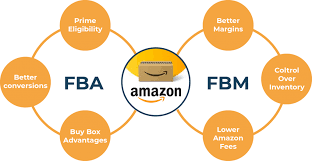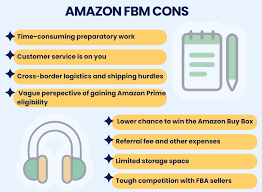
Introduction
On Amazon, FBM stands for Fulfilled by Merchant. This means that when a customer buys a product, the merchant (seller) is responsible for storing, packaging and shipping the product directly to the customer, rather than Amazon handling the logistics.
This contrasts with FBA (Fulfilled by Amazon), where Amazon stores products in its own warehouses, manages shipping, and provides customer service for orders. With FBM, the merchant has more control over inventory and fulfillment, but also bears responsibility for on-time delivery and customer service.
Here we will discuss some main keywords related to Amazon Modals.
Keywords
- what is FBA and FBM?
- How does FBM work on Amazon?
- is FBM free on Amazon?
- Is FBM is better than to FBA?

(2):FBM on Amazon (Completed by Merchant):
Storage and Shipping: The seller is responsible for storing, packing and shipping the products directly to the customer.
Customer Service: Merchant handles all customer service and returns.
No Prime Eligibility: FBM on amazon products are generally not eligible for Amazon Prime, which can affect delivery speed and customer appeal.
Fees:
There are low fees, as Amazon is not involved in logistics.


How does FBM work on Amazon?
FBM Amazon as a Merchant (FBM) allows a full seller to take full control of storage, packaging, shipping, and customer service for their products.
Here’s how FBM works step-by-step:
(1): The seller lists the product on Amazon:
- A seller creates a listing for their product on Amazon like any other product, providing details such as price, quantity and shipping options.
- The seller selects FBM as the fulfillment method, indicating that they will handle all logistics.
(2): Order received:
- When a customer orders an FBM product, the seller receives a notification from Amazon.
- Amazon acts as a platform to process the transaction and transmit the order details to the seller.
(3): Seller handles fulfillment:
Inventory Storage: The seller stores the product in its warehouse, home, or other storage facility.
Packing: Seller is responsible for packing the product properly for shipping.
Shipping: Seller selects the shipping carrier (for example, USPS, FedEx, DHL) and manages the shipping process. Seller must provide tracking information to customer through Amazon.
Shipping Costs: The seller can decide whether to charge the customer for shipping or offer free shipping, but they are responsible for the cost.
(4): Customer receives the product:

(6):Seller’s Fees:
- Sellers using FBM still pay Amazon a referral fee for each sale (a percentage of the product’s price), but they don’t pay Amazon for storage, shipping, or fulfillment services (as FBA does). is the case).
- This results in lower fees for sellers, but they must absorb the cost of shipping and logistics on their own.
- Amazon monitors the performance of FBM sellers through metrics such as order error rates, late deliveries, and customer feedback.
- Poor performance can lead to penalties, such as suspension from selling on Amazon.
Inventory Management:
Order Fulfillment:
Customer Service:
Shipping:
More Control:
No Prime Eligibility:
Logistics Responsibility:
Difficult to scale:

Is FBM is better than to FBA?
When FBM may be better:
Low sales volume:
Products with higher shipping costs:

When can FBA be better?
Higher sales volume:
FBA is best for high-volume sellers because Amazon’s fulfillment network can efficiently handle large orders and manage logistics for you, allowing you to focus on growing your business.
Basic Qualifications:
Products fulfilled by FBA are eligible for Amazon Prime, which gives them faster shipping options and makes them more attractive to Prime customers. Prime Eligibility can significantly increase your sales.
Improved shopping box functionality:
FBA products have a better chance of winning the Buy Box, which is the section where customers can click “Add to Cart” or “Buy Now.” Winning a buy box can dramatically increase sales.
Time saving and scalability:
With FBA, you don’t have to worry about storing products, packing, shipping, or managing returns. This frees up time for other aspects of your business, making it easier to scale.
Amazon Managed Customer Service:
Amazon handles all customer service and returns for FBA orders, reducing your workload and simplifying the after-sales process.
Fast and reliable shipping:
Amazon’s shipping and fulfillment infrastructure is highly reliable and can deliver products faster, improving customer satisfaction.






